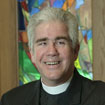Commentary on John 1:1-14
Christmas candles and wintertime in North America compel John’s description of Jesus as Light shining in the darkness to jump off the page and into the preacher’s mouth.
For an alternative approach, rather than helping our hearers to see the light of Christ shining in the darkness, preachers might help them to hear Jesus as God’s love song, singing life into the world’s babble, chaos, and voices of death.
John’s description of Jesus in the Prologue is poetic, even lyrical speech. It is an echo of or response to God’s love song, which is Christ. I hear “Of the Father’s Love Begotten” (ELW #295) as I meditate on John’s words. We might imagine the sermon as a Christmas carol — more evocative than explanatory — because this is in keeping with the reading’s genre and because most Christmas Day worshipers are not thinking logically. It’s better to inspire than inform.
John sings that Jesus is the Word of God become flesh, who from all eternity was with God, and actually is God. While we think of “word” as something written or printed, John’s description of Jesus as logos means first of all something said. Reread John 1:1-14 aloud, substituting speech for word, and hear the difference it makes. In Luke’s Christmas story, angels bring the good news of great joy. In John, Jesus has been singing love and bringing life from the beginning.
Genesis tells us that God said, “Let there be . . .” and there was. God spoke day and night, heaven and earth, land and sea, plants and animals, and humanity into being. Jesus is that utterance. Jesus is God’s eternal speech, which existed before anything else and called everything into being.
More than this, Jesus is the Word of God as it has been read and preached in Israel ever since the time of Moses, and as it continues to be read and preached in the worship of the Christian Church. As the law was given through Moses as the Word of God, John says, so grace and truth are given to us in Jesus Christ. It is essential to keep in mind John regards both law and grace as God’s life-giving, world-changing speech.
This speech became flesh and pitched a tent among us. In the Incarnation, God’s eternal expression was articulated within our world and within human history in a particular person. Jesus, then, is “God’s sermon preached to us in the living out of a human life.”1 Jesus became the enfleshment of what God says — even sings — to us.
And what is God saying to us? First, God says, “This is who I am!” God speaks in Jesus as in no other way; not as in the Bible, not as in nature, not as by human reason or accomplishment, not as by listening to inner voices. Jesus tells us who God is. In Jesus we hear that God heals, forgives, embraces outcasts, and prays for those who hurt him. In Jesus we hear that God understands betrayal and denial, suffering and pain, humiliation and death. Jesus tells us that God knows that, both as individuals and as a world, we need a Savior; and Jesus is that Savior. In Jesus we hear that God brings victory over despair, defeat, destruction, and death; and God wills and shares that victory with us, with humanity, with creation.
The Christ who comes to us not only tells who God is; Jesus speaks God’s power into our lives. John writes, “But to all who received him, who believed in his name, he gave power to become children of God” (John 1:12). Jesus can do this because Jesus has power to create, power over all creation, power to restore us to what God wants us to be, and to give life everlasting.
As God’s Speech, Jesus is able to do as he wishes; and what Jesus wishes is to give to men, women, and children the authentic, abundant life of the children of God. Jesus draws us into God’s abundant life on the cross, proclaims victory over death by rising from the tomb, and empowers us to share abundant life by breathing the Holy Spirit into us. Through Jesus, God begets children of God and gives them eternal life.
God is not unknown to us. John says, “The light shines in the darkness, and the darkness has not overcome it.” I might say, “Though other voices strive to drown it out, God’s Love Song is not silent.” Although the mystery of God is never diminished, all that we could possibly know in this world about God is disclosed as fully as possible in Jesus Christ. John writes, “No one has ever seen God; the only Son, who is in the bosom of the Father, he has made God known.”
In response to God’s Love Song, we echo Luke’s angels and song, “Glory to God in the highest and peace to his people on earth!” John’s Hymn of Praise is different. John glorifies God with another hymn:
“And the Word became flesh and dwelt among us, full of grace and truth; we have beheld his glory, glory as of the only Son from the Father. And from his fullness have we all received, grace upon grace.”
Although we may not be singing these words, because they are not a Christmas carol, Jesus, God’s Speech made flesh, sings them into our hearts so that we know who God is. Knowing who God is, we know who we are as well. And we sing.
1 Hughes Oliphant Old, The Reading and Preaching of the Scriptures in the Worship of the Church: The Biblical Period (Grand Rapids: William B. Eerdmans Publishing Company, 1998), Vol. 1, p. 137.

December 25, 2012